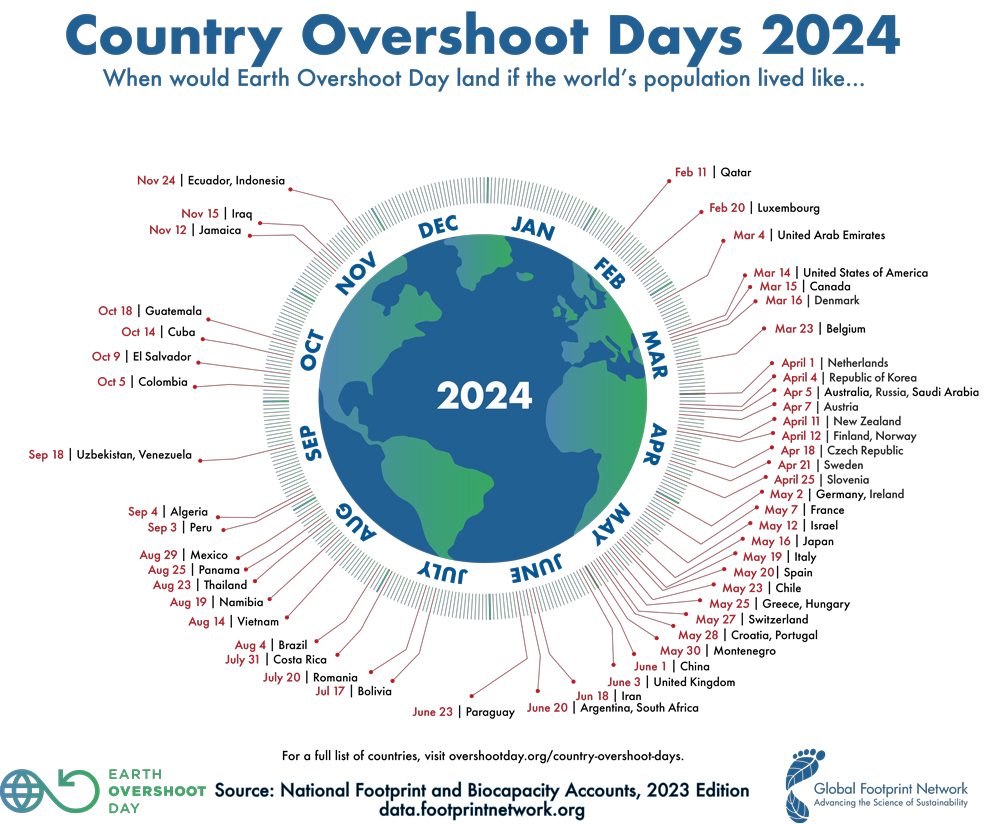On August 1, 2024, humanity marked Earth Overshoot Day—the day when we have consumed all the natural resources the planet can regenerate in a year. This event signals our continued trend of ecological overshoot, using more than what Earth can sustain. But amid the concerns, global actions and innovations hint at a potential turning point in our efforts to #MoveTheDate and restore balance to our planet’s resource use.

Post-Pandemic Rebound and Resource Consumption
The COVID-19 pandemic caused a brief delay in Earth Overshoot Day, pushing it back to August 22, 2020. However, as economies reopened, the rebound effect set in:
- 2021: July 29
- 2022: July 28
- 2023: August 2
- 2024: August 1
This data reveals an upward trend, albeit slow, in extending the planet’s resource budget, signaling that the global push for sustainability is having some effect. But, the fact remains: humanity is consuming resources at a rate that would require 1.7 Earths to sustain annually (Global Footprint Network)(Earth.Org).
Global Initiatives to Reverse the Trend
Circular Economy
One of the most significant movements in addressing overshoot is the shift toward a circular economy. In contrast to the traditional linear model of production (make, use, dispose), the circular economy emphasizes reusing, repairing, and recycling materials to minimize waste. Key initiatives include:
- The EU Circular Economy Action Plan, which aims to establish sustainable products as the norm across Europe.
- Corporations like IKEA and H&M have pledged to become fully circular by 2030, drastically reducing their environmental footprints (Earth.Org).
Renewable Energy Revolution
The renewable energy sector has made major strides:
- Solar and wind power now supply 10% of the world’s electricity, a significant milestone in the transition from fossil fuels.
- Countries like Denmark and Uruguay now generate over 90% of their electricity from renewables(Earth.Org).
These efforts not only reduce carbon emissions but also help reduce our reliance on finite natural resources, an essential step toward addressing Earth Overshoot.
Emerging Technologies Shaping the Future
Carbon Capture and Storage (CCS)
Carbon Capture and Storage technology (CCS) is advancing rapidly. Since 2020, global CCS capacity has grown by 33%, with 30 new facilities in the pipeline. These innovations are critical for industries that are hard to decarbonize and for reducing atmospheric carbon (Global Footprint Network)(Earth.Org).
Sustainable Agriculture
Agriculture, responsible for much of our ecological footprint, is also undergoing a transformation. Vertical farming drastically cuts land use by up to 99% compared to traditional farming methods, while precision agriculture reduces water consumption by as much as 30%. These technologies are vital for producing food more efficiently as the global population grows (Earth.Org).
How EPAS is contributing towards #MoveTheDate
EPAS actively supports the circular economy by developing technologies that transform waste into valuable resources. Their GreaseShield® system captures fats, oils, and grease (FOG) from wastewater, which can then be processed and converted into biodiesel, a renewable energy source. By preventing FOG from clogging sewers and repurposing it into clean energy, EPAS helps reduce waste, minimize environmental pollution, and support the circular use of materials. This process exemplifies how EPAS contributes to a regenerative economy, where waste is continuously cycled back into productive use, reducing reliance on fossil fuels and supporting a more sustainable future.
A Glimpse of Hope
Despite the dire implications of Earth Overshoot Day, recent trends show that change is possible. The global push for circular economies, renewable energy, and sustainable agriculture is starting to have an impact. While challenges remain, these advancements provide a pathway toward pushing back the date and eventually living within the means of one planet.
By raising awareness and embracing new innovations, Earth Overshoot Day 2024 can be more than just a milestone—it can be the turning point for our collective ecological future.



























